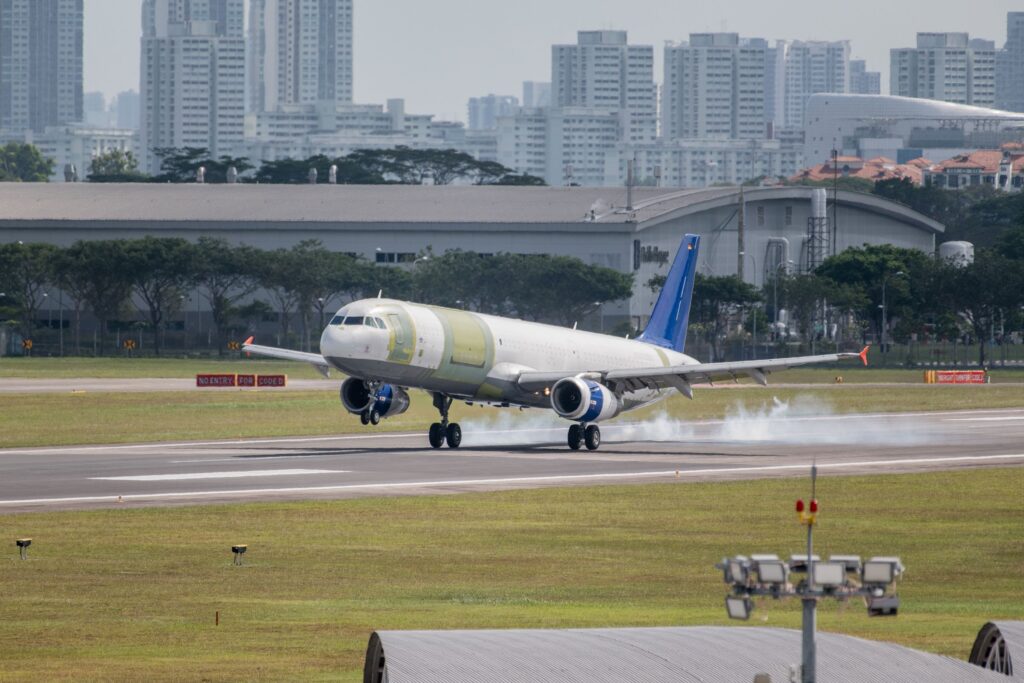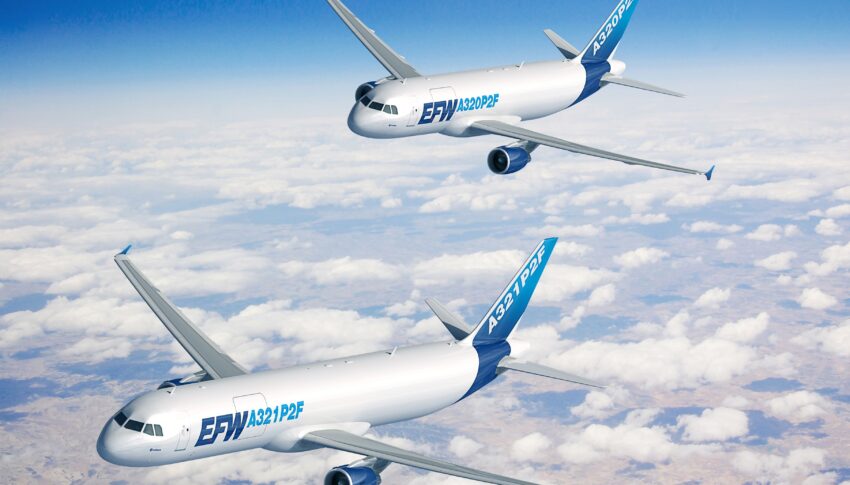A dynamic cargo market, driven by growing e-commerce demand and — ironically enough — the COVID-19 pandemic, has pushed some carriers to operate all-cargo flights. Cargo is either transported strapped onto passenger seats, or in preighter configuration, where the seats have been removed to accommodate the cargo. Indian low-cost carrier IndiGo, meanwhile, is taking a different tack: acquiring Airbus A321ceos that will be converted into freighters, allowing it to transport cargo on the main deck in pallets rather than on seats.
IndiGo says it secured two aircraft from an unnamed lessor, with the expectation of signing a separate deal for another two “shortly”. These aircraft will be converted from their passenger configuration to freighters by Elbe Flugzeugwerke (EFW), a Dresden-based joint venture between Airbus and Singapore’s ST Engineering.
IndiGo hopes that conversion of the A321ceos into A321P2F (passenger-to-freighter) version will allow the airline to transport up to 27 tonnes of payload, or up 24 unit load devices (ULD) on the main and lower decks, on domestic and regional missions. This is higher than the Boeing 737-800 freighter’s payload of nearly 23 tonnes — but, crucially, on the 737 only 12 ULDs can be loaded on the main deck while the lower deck can be used for bulk cargo. Delivery of the four aircraft will take place between 2022 and 2023, and more could be acquired “depending on market development”.

For IndiGo, the P2Fs will cover parts of Asia and the Middle East, where the A320/A321P2F family aircraft is capable of flying up to 2,300nm on a full payload. Data from the Great Circle Mapper indicates that from India’s capital, New Delhi, the freighters can fly to points in Central Asia, China, the Middle East, and most of southeast Asia.
With the acquisition, IndiGo would join rival SpiceJet in operating dedicated freighters, where it has 20 freighters and preighters of various types and 101 passenger aircraft in service. (SpiceJet also has a cargo subsidiary by the name of SpiceXpress.)
IndiGo’s chief executive, Ronojoy Dutta, attributed the decision to acquire the A321P2Fs to the growth of its playfully named CarGo business. He says the airline “was already the largest carrier of cargo in domestic India before COVID-19”, and he expects the market to continue growing after the pandemic.
Independent analyst Shukor Yusof of Endau Analytics tells us air cargo — even in passenger aircraft — has become a lucrative business, as the COVID-19 pandemic has resulted in sharp declines in passenger flying.
While the initial four A321P2Fs would not have a significant impact on IndiGo’s fleet numbers, the freighters can play a complementary role to its existing business. This is also supported by the carrier’s network reach in India, a strong balance sheet, and competent management, he says.
At the same time, he believes SpiceJet’s example of operating multiple types of freighters and preighters is best avoided as it can lead to higher operating expenses.
“It’s never a good idea for airlines, especially low-cost airlines, to dabble with different models of aircraft because it’s going to cost more [on] your balance sheet”, says Shukor.
But for a country the size of India, data from the country’s Directorate General of Civil Aviation (DGCA) up to August 2020 only listed one dedicated Indian cargo carrier: Blue Dart Aviation. While Air India appeared to have a dedicated cargo fleet back in 2009, the airline’s latest fleet update shows that this is no longer the case.
Shukor notes that prior to the Covid-19 outbreak, yields for air cargo were “marginal” and transporting cargo by air was better suited to cargo carriers than a passenger carrier. But the pandemic and growth of e-commerce has since changed the situation.
Asked on the likelihood that another Indian carrier would establish a dedicated cargo operation, Shukor expressed doubt as this requires a large investment.
Using full service carrier Vistara as an example, launching such operations will require shareholders Tata Sons and Singapore Airlines to agree to provide the needed capital. In comparison, IndiGo has the infrastructure in place and already operates Airbus A320 family jets — the same type of aircraft as the freighters it is acquiring, he says.
While there are known challenges of operating in the country, Shukor pointed to the numerous advantages India can offer.
This includes its geographical position and proximity to neighbouring countries, a large population size and availability of skilled human resources, as well as support by the Indian government to develop transshipment hubs to other regions, he adds.
At this juncture, it remains unclear if any other Indian carriers have plans to acquire their own dedicated freighters, but IndiGo’s cautious start is worth keeping an eye on.
Author: Firdaus HASHIM
Published: 30th September 2021




